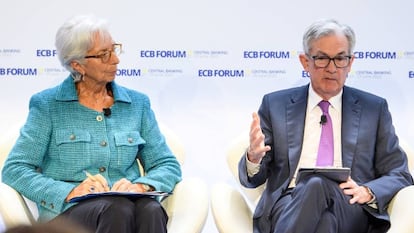Euro falls to 20-year low against US dollar and approaches parity
The EU currency is declining as the idea gains ground that the ECB will not raise rates as fast as the Federal Reserve in order to safeguard growth

The possibility that a US dollar and a euro will be worth exactly the same is getting closer to becoming a reality. The single currency suffered further falls this Tuesday and was trading for 1.028 dollars in the currency market, a level not seen in the last 20 years, specifically since December 2002. Investors believe that the weakness of the latest economic data will push the European Central Bank (ECB) to go slower in raising interest rates for fear of triggering a recession. Slower rate hikes would mean a devaluation of the euro against the dollar, given that the Federal Reserve is conducting a much more aggressive policy to contain inflation.
The trend is clear. The euro has lost 9% so far this year and 13% in the last 12 months. And no one is assuming that the correction is over. Three more sessions with falls similar to Tuesday’s would be enough to reach euro-dollar parity. And many analysts predict that it is inevitable. “The evolution of interest rates in the US against the euro zone will continue to attract capital flows to the dollar zone,” says Ignacio de la Torre, chief economist at Arcano Partners. This is because the Federal Reserve is making the price of money more expensive at a faster rate, making higher yields possible and turning the dollar into a safe haven in times of uncertainty.
The president of the ECB, Christine Lagarde, has been immersed in a dilemma for months: raise rates boldly to curb the suffocating inflation (8.6% in June), even at the cost of stressing borrowing costs for southern European countries and disrupting the recovery, or go slower despite the risk that the economy will enter a spiral of rising prices and wages from which it is not easy to get out.
That decision, which places her between a rock and a hard place, affects endless variables. If Lagarde chooses to deviate from the Fed’s path and undertakes a rate hike of only 25 basis points in July to protect growth, the euro will continue to weaken. This has some advantages at first glance: European exporters are more competitive because they sell their products cheaper than other rivals without hitting their margins, European multinationals that repatriate profits or receive dividends from their foreign subsidiaries get more euros for the same sales , and the euro countries that receive non-EU tourists become more attractive because their hotels, restaurants and stores are cheaper.
The coin has another side. With a weak euro, buying energy - which is mostly paid for in dollars - becomes more expensive in an environment where oil and gas prices are already soaring. Spain, highly dependent on energy imports, is already suffering from this reality, but Germany is the victim that has made the most noise in recent hours: the EU’s engine of growth on Monday announced its first trade deficit since German reunification due to the fact that its powerful export sector was not able to compensate for the hikes in the energy bill.
Four and a half months of war in Ukraine have been enough to end more than three decades of trade surpluses for Germany, whose reliance on Russian gas is forcing it to rethink its model. In fact, Germany is burning coal again to ensure supply despite the fact that environmentalists are in charge of the Ministry of Economy and Climate.
Tu suscripción se está usando en otro dispositivo
¿Quieres añadir otro usuario a tu suscripción?
Si continúas leyendo en este dispositivo, no se podrá leer en el otro.
FlechaTu suscripción se está usando en otro dispositivo y solo puedes acceder a EL PAÍS desde un dispositivo a la vez.
Si quieres compartir tu cuenta, cambia tu suscripción a la modalidad Premium, así podrás añadir otro usuario. Cada uno accederá con su propia cuenta de email, lo que os permitirá personalizar vuestra experiencia en EL PAÍS.
¿Tienes una suscripción de empresa? Accede aquí para contratar más cuentas.
En el caso de no saber quién está usando tu cuenta, te recomendamos cambiar tu contraseña aquí.
Si decides continuar compartiendo tu cuenta, este mensaje se mostrará en tu dispositivo y en el de la otra persona que está usando tu cuenta de forma indefinida, afectando a tu experiencia de lectura. Puedes consultar aquí los términos y condiciones de la suscripción digital.









































